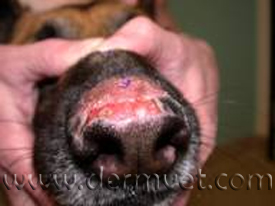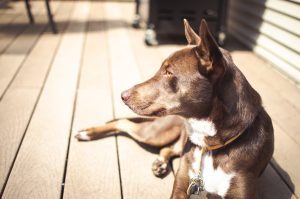What is Discoid Lupus Erythematosus in Dogs?
Discoid Lupus Erythematosus (DLE) is an autoimmune disorder that affects the skin of dogs. It causes red, scaly, and bald patches to form on the body, often located around the nose and eyes. In some cases, it can also cause sores or lesions on the skin. The patches usually last for weeks or months and can be very uncomfortable for the animal. The exact cause of DLE is unknown but it is believed to be related to genetics and environmental factors such as exposure to sunlight or certain medications. Treatment typically involves managing secondary infections as well as controlling levels of inflammation with medications or lifestyle changes.
What are Common Symptoms of Discoid Lupus Erythematosus in Dogs?
Common symptoms of Discoid Lupus Erythematosus (DLE) in dogs include red lesions, inflammation, crusting and scaling on the skin, hair loss, thickening of the skin and secondary infection. Additionally, DLE can cause eye problems such as conjunctivitis and keratitis which can lead to vision problems. DLE can also be associated with joint stiffness and arthritis-like symptoms if left untreated.
Can Any Dog Develop DLE?

Credit: dermvetolympia.com
Discoid Lupus Erythematosus (DLE) is not a common disorder in dogs. It is estimated to affect between 1 and 3 percent of the canine population, with larger breeds being at higher risk than smaller ones. Additionally, certain breeds such as Bullmastiffs and Boxers tend to be more prone to developing DLE than other breeds. Symptoms can range from mild to severe, and most cases of DLE will require some form of treatment or lifestyle change in order to manage it effectively.
Conventional Treatments for DLE in Dogs
Conventional treatments for Discoid Lupus Erythematosus (DLE) typically involve managing secondary infections, controlling levels of inflammation, and avoiding excessive sun exposure. Medications such as corticosteroids or other immunosuppressive drugs may be used to reduce inflammation and prevent further damage to the skin. Additionally, a diet that is rich in omega-3 fatty acids and vitamins may help reduce symptoms. In some cases lifestyle modifications such as avoiding too much sun or using sunscreens can provide some relief from the effects of DLE. In severe cases, surgical removal of affected areas may be necessary in order to stop further progression of DLE symptoms.
Holistic Remedies for DLE
Holistic remedies can be a great approach to treating Discoid Lupus Erythematosus (DLE) in dogs. The first step is to improve the pet’s nutrition, as a healthy diet can reduce inflammation and other symptoms of this condition. Adding fatty acid supplements like fish oil, omega-3 essential oils, or flaxseed oil to their meals can help reduce itching and encourage healthy skin. Other natural treatments include herbal supplements such as chamomile or burdock root which have anti-inflammatory properties, and aloe vera or honey which may help soothe affected areas. Regular grooming with gentle shampoo and conditioners are also important to keep lesions clean and reduce inflammation. Vet visits should still be scheduled for regular checkups as these remedies should not replace prescribed medications for DLE.
Natural supplements can be an effective way to help horses suffering from Cushings, a medical condition caused by too much cortisol in the body. These supplements are formulated with pure, natural ingredients that can support the horse’s endocrine system and reduce signs of Cushing’s. They may include herbs like ashwagandha, vitex agnus-castus, and St. John’s wort which are known for their anti-inflammatory properties. Other important components of these supplements may be B Vitamins and omega fatty acids to reduce stress levels in horses with Cushings. Additionally, probiotics can aid in digestion and the absorption of nutrients, leading to balanced hormones and better overall health for horses afflicted with this disease.
While natural remedies can be beneficial in treating Discoid Lupus Erythematosus (DLE) in dogs, it is important to understand the risks associated with using these treatments. Natural remedies may interact with certain medications and it is best to consult a vet before using them. Some herbal supplements have the potential for allergic reactions or toxicity, so proper dosage should be monitored as well. Additionally, some products can contain ingredients which may not be suitable for pets and should always be double checked beforehand.
remedies may interact with certain medications and it is best to consult a vet before using them. Some herbal supplements have the potential for allergic reactions or toxicity, so proper dosage should be monitored as well. Additionally, some products can contain ingredients which may not be suitable for pets and should always be double checked beforehand.
Herbal supplements that may cause allergic reactions or toxicity when used to treat Discoid Lupus Erythematosus (DLE) in dogs include echinacea, ginkgo biloba, licorice root, and St. John’s Wort. It is important to research each supplement carefully and consult with a vet prior to use. In addition, proper dosage should be monitored as some herbs can be toxic if taken in large quantities or unsuitable for certain pets.
Natural remedies or holistic treatments, such as adding fatty acid supplements to a pet’s diet, using herbal supplements, and regular grooming, can be beneficial for treating Discoid Lupus Erythematosus (DLE) in dogs. However, these should not replace prescribed medications for DLE which are often necessary to control the disease and reduce inflammation. It is important to continue following vet recommendations and visit regularly for checkups while also considering additional holistic approaches.
Raw Diets for DLE Patients
A raw diet can be beneficial for dogs with Discoid Lupus Erythematosus (DLE). Raw diets may include meats, organs, and bones that have not been cooked or processed. Eating raw meats can provide more complete nutrition as they are higher in healthy Omega-3 fatty acids, vitamins and minerals than cooked foods. Additionally, unprocessed foods contain fewer additives and preservatives which can help reduce inflammation for DLE affected dogs. It is important to ensure that the raw diet includes balanced amounts of all essential nutrients to ensure that your dog maintains optimal health.
Managing Lifestyle
Lifestyle changes can help to manage Discoid Lupus Erythematosus (DLE) in dogs. Proper nutrition with a balanced diet rich in vitamins and minerals helps to keep the skin healthy and avoid secondary infections. Regular exercise is also important for increasing circulation and improving immunity. Sunlight exposure should be limited to prevent further damage from ultraviolet radiation. To limit sunlight exposure for managing Discoid Lupus Erythematosus (DLE) in dogs, the animal should not be exposed to direct sunlight for extended periods of time. Areas with shade should be used on hot days and sunscreen can also be used to protect sensitive areas of the skin. Owners can also take their pet indoors during midday when the sun is strongest. Additionally, if possible, avoid taking your dog outside when the air is polluted because this can worsen DLE symptoms. Additionally, regular grooming should be done to remove infected areas of the skin or fur.
Outcomes for DLE Dogs
The outcome for dogs with Discoid Lupus Erythematosus (DLE) can vary depending on the severity of the condition and how quickly it is treated. In most cases, treating the secondary infections and reducing sun exposure while controlling inflammation can improve symptoms significantly. Some cases may require more extensive treatments such as surgery or further lifestyle changes in order to prevent further damage to the affected skin. With proper treatment and timely intervention, most dogs with DLE can lead normal, comfortable lives.
